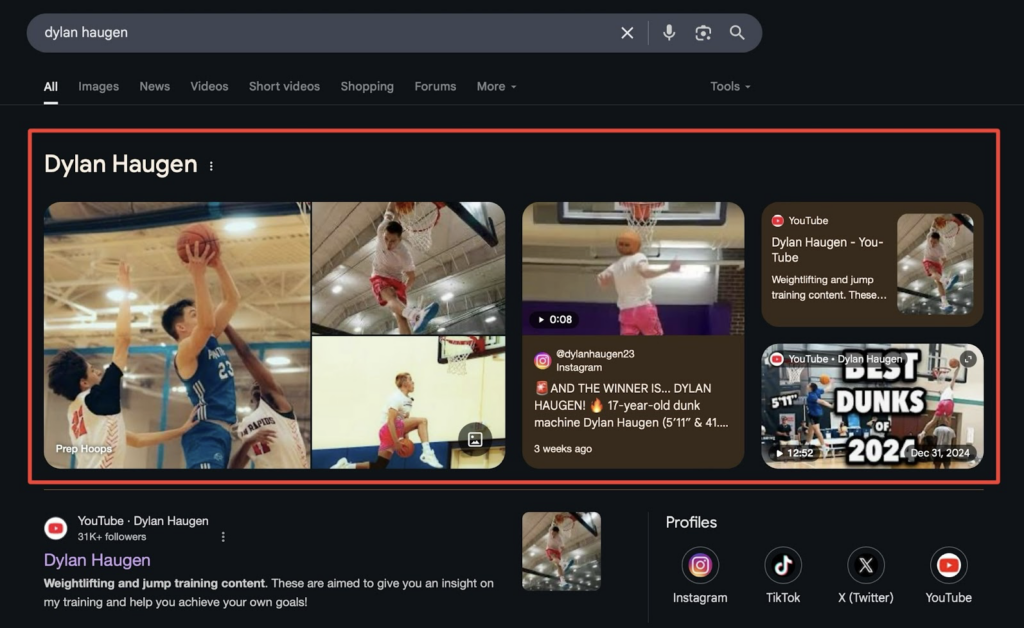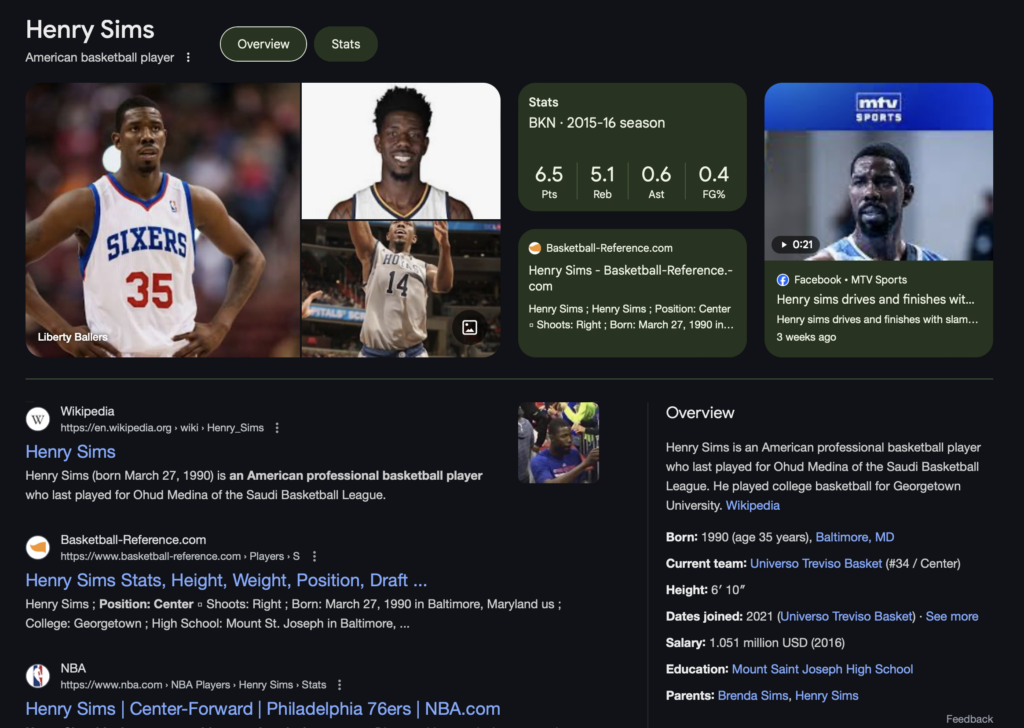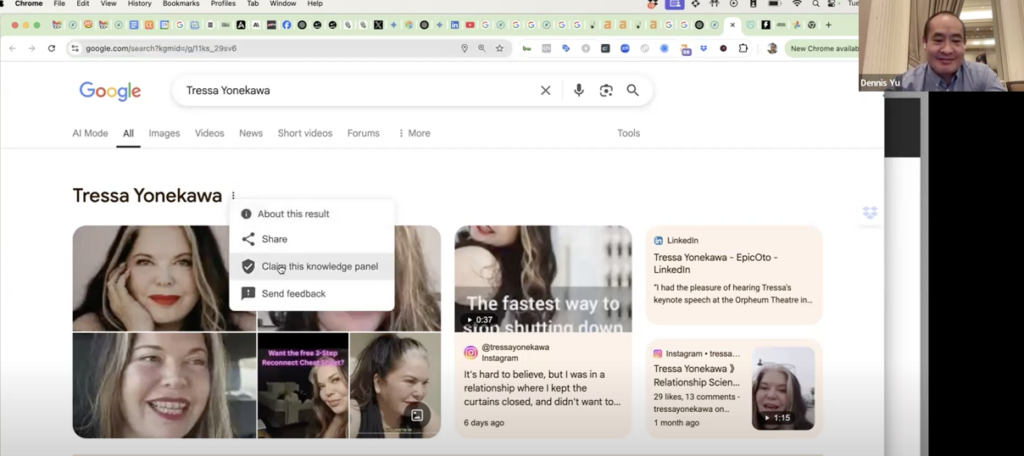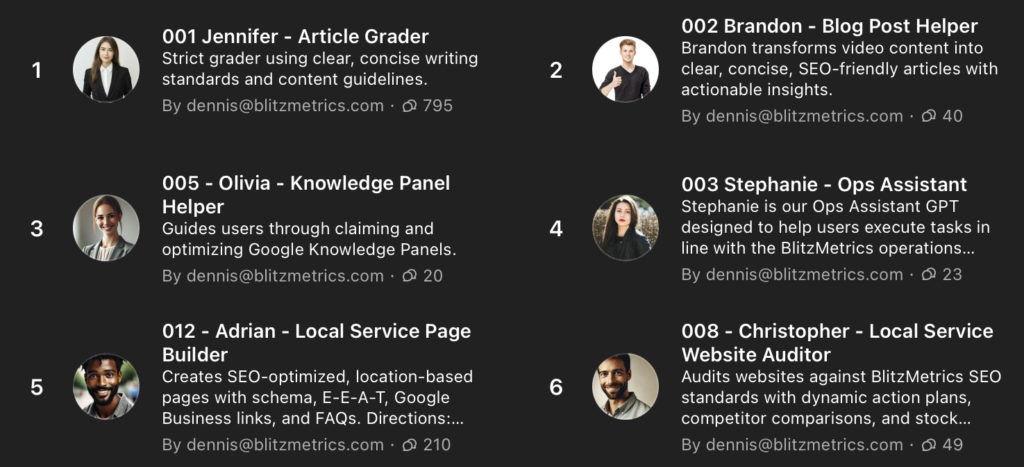When someone searches your name, does Google return content you control? Or are you lost in a mix of unrelated results?
That question became the focus of a tactical training Dennis Yu led for the Sims Distillery community on May 2, 2025. In a one-hour session with Henry Sims and his mastermind group, Dennis broke down how personal brands can trigger and claim a Google Knowledge Panel—even if they’re not famous.
Dennis built the analytics systems at Yahoo before launching BlitzMetrics. His background in search engineering gives him a clear view into how Google’s Knowledge Graph evaluates identity and authority—and what it takes to influence it.
During the session, he showed Sims Distillery members how to structure their existing content so Google recognizes their identity and builds confidence in it. The approach is straightforward: connect real assets, organize your presence, and let the structure speak for itself.
What Is a Knowledge Panel?
A Google Knowledge Panel includes the colored summary boxes and the verified information that appears on the right-hand side of search results when you look up a recognized person or brand. It’s Google’s way of saying: “We know who this is.”

A Knowledge Panel signals:
- Authority – You’re recognized as a known entity.
- Credibility – Google can connect your identity to other public records.
- Visibility – You occupy prime real estate in search results.
Dennis emphasized that a Knowledge Panel isn’t just for celebrities. It’s for anyone who has structured their content well and built strong enough signals across the web.
Why Most People Don’t Show Up
Dennis used the example of Henry Sims to demonstrate what often goes wrong. Searching “Henry Sims” brings up a basketball player and a fiddler—but not the founder of Sims Media.

Why? Because Google can’t tell which “Henry Sims” is the right one.
This often happens when:
- Content is scattered across platforms
- There’s no central personal brand website
- Interviews, bios, and videos aren’t properly linked
Google operates on confidence scores—the more consistent and interconnected your digital presence is, the more likely Google will assign a Knowledge Panel to you. Once that panel appears, you still need to claim it to verify your identity and manage what appears.
The Process: Teaching Google Who You Are
Dennis outlined a specific method to help attendees take control of their digital identity.
- Buy your domain name
Example: firstnamelastname.com. Publish your content there—not only on social platforms. - Create a Topic Wheel
Choose three personal and three professional themes you consistently talk about. This helps you build relevance and consistency across your content. - Associate with authoritative people and events
Podcasts, interviews, speaking engagements, and backlinks matter. Every connection increases your credibility. - Repurpose your existing media
Don’t create more content—organize what you already have. Zoom calls, podcast audio, and phone videos all become blog posts, snippets, and knowledge signals when properly structured. - Connect everything back to your site
Your domain should link to your YouTube, LinkedIn, press features, and any other properties. Make it the central hub.
“It’s not about creating more content. It’s about organizing what you already have.” — Dennis Yu
Real Example: Knowledge Panel Wins in Real Time
Bronwyn and Tressa, two attendees from Sims Distillery, discovered live on the call that they already had Knowledge Panels—they just hadn’t claimed them yet.

Dennis walked them through it:
- Use the Knowledge Graph Explorer tool to search your name.
- If a panel exists, click the three-dot menu.
- Select “Claim this knowledge panel.”
- Submit a factual justification with links to your LinkedIn, website, or articles.
“A lot of people already have panels,” Dennis said. “They just don’t know it yet.”
This moment sparked action across the group. Once Bronwyn and Tressa started the process, others followed.
Automating the Content Workflow
To scale this system, Dennis showed how he uses AI tools and assistants trained on real experience—not prompts.

Zoom recordings are saved, transcribed, processed, and turned into SOPs or articles using tools like ChatGPT and Gemini.
This isn’t about replacing humans. It’s about getting more done by organizing what’s already been said.
How to Get Started
If you’re building a personal brand—or trying to clean up your online presence—start here:
- Search your name on Google.
- Do you have a Knowledge Panel?
- Is the top content about you—or someone else?
- Claim your panel if it exists.
- Use the triple-dot menu in the panel to begin the claim process.
- Organize your content.
- Connect your website, social profiles, interviews, and articles.
- Use internal linking and schema to make relationships clear.
- Train Google using your real assets.
- Publish content that ties back to your domain.
- Answer questions people are already searching.
Final Word from Dennis
“Google is the ultimate source of truth. If you don’t define who you are, AI will make it up for you.” — Dennis Yu
Want to build your own structured content machine? Start with the Topic Wheel and connect the dots using your own photos, videos, and posts. The goal isn’t to create more. It’s to help Google see what’s already true.

